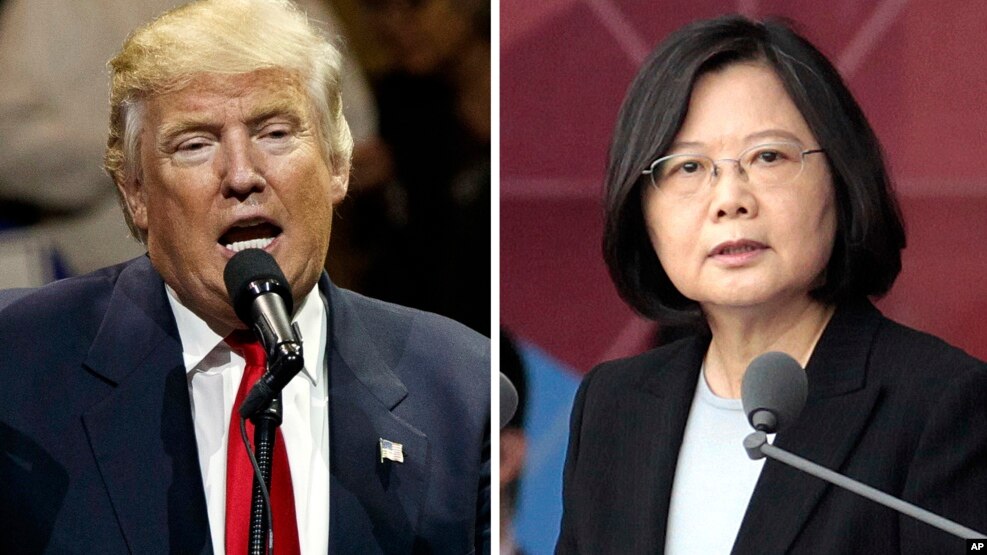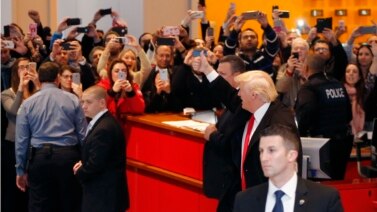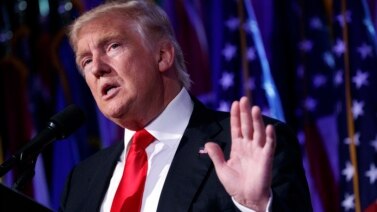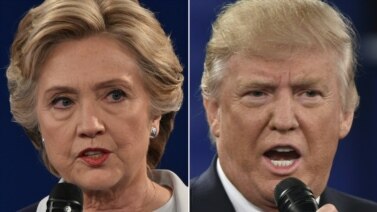
U.S. President-elect Donald Trump says he would not be tweeting as much if he got fairer news coverage.
But he wrote on Twitter, Monday, that he did not know if “that will ever happen.”
If the press would cover me accurately & honorably, I would have far less reason to "tweet." Sadly, I don't know if that will ever happen!
— Donald J. Trump (@realDonaldTrump) December 5, 2016
Trump has been busy on Twitter in recent days. Among other subjects, he wrote about his telephone call with Taiwan's president, Tsai Ing-wen. Their discussion broke diplomatic norms.
The President of Taiwan CALLED ME today to wish me congratulations on winning the Presidency. Thank you!
— Donald J. Trump (@realDonaldTrump) December 3, 2016
For more than 30 years, U.S. presidents have avoided direct contact with Taiwan's leaders in support of the government's one-China policy.
Interesting how the U.S. sells Taiwan billions of dollars of military equipment but I should not accept a congratulatory call.
— Donald J. Trump (@realDonaldTrump) December 3, 2016
Did China ask us if it was OK to devalue their currency (making it hard for our companies to compete), heavily tax our products going into..
— Donald J. Trump (@realDonaldTrump) December 4, 2016
their country (the U.S. doesn't tax them) or to build a massive military complex in the middle of the South China Sea? I don't think so!
— Donald J. Trump (@realDonaldTrump) December 4, 2016
Last week, Trump said on Twitter that he plans to stop the Obama administration's move to normalize relations with Cuba, unless Cuba gives the United States “a better deal.”
If Cuba is unwilling to make a better deal for the Cuban people, the Cuban/American people and the U.S. as a whole, I will terminate deal.
— Donald J. Trump (@realDonaldTrump) November 28, 2016
His comments came after the death of former Cuban leader Fidel Castro.
It was not the first time Trump and his advisers said a Trump administration might end President Barack Obama's two-year efforts to improve ties with Cuba.
But it was the first time the next U.S. leader announced a major foreign policy decision on social media. Twitter has been Trump's chosen social media network to express his opinions -- both as a presidential candidate and, more recently as he forms his administration.
Trump will be sworn-in as president on January 20, 2017.
Trump Still a Twitter Regular
Also last week, Trump expressed on Twitter his position about a move to recount ballots from the U.S. presidential election. Former Green Party presidential candidate Jill Stein asked for the vote recount in three states.
Trump, a businessman, was the Republican Party's candidate. He said on Twitter that Hillary Clinton won the popular vote because of millions of illegal votes. Clinton was the candidate of the Democratic Party. She now leads the popular vote by 2.5 million ballots.
Serious voter fraud in Virginia, New Hampshire and California - so why isn't the media reporting on this? Serious bias - big problem!
— Donald J. Trump (@realDonaldTrump) November 28, 2016
In his tweets, Trump said there was "serious voter fraud" in Virginia, New Hampshire and California -- all states won by Hillary Clinton. He also attacked the cable news network, CNN.
.@CNN is so embarrassed by their total (100%) support of Hillary Clinton, and yet her loss in a landslide, that they don't know what to do.
— Donald J. Trump (@realDonaldTrump) November 29, 2016
State election officials, both Republican and Democratic, have rejected Trump's claim.
Trump won enough states to enjoy a large lead in America's Electoral College. Members of the Electoral College are set to meet on December 19 to officially elect the next president. All signs point to Trump winning, even with the vote recounts.
Trump's supporters say they enjoy reading his comments on Twitter. At his campaign events, people praised Trump for “telling it like it is.”
Trump Says Tough Talk Leads to Better Negotiating
Trump has defended his strong language. Taking strong positions, he said, is part of his negotiating style to get better deals.
But some diplomats say his strong words on Twitter and elsewhere could lead to misunderstandings, or worse.
Aaron David Miller was a Middle East negotiator for three different U.S. administrations, Democratic and Republican. He is now a vice-president at the Wilson Center, a research-policy center based in Washington, D.C.
“We've never really confronted a potential like this before -- certainly not in the administrations I've worked for,” Miller said.
Kellyanne Conway directed Trump's presidential campaign. She told CNN television on Sunday that no decision has been made on how much Trump will tweet once he is president.
Conway told CNN that Trump believes Twitter and Facebook provide him with a good way to talk directly to people. She said his tweets and Facebook posts reach 25 million people or more.
But it can be hard to express positions on major issues in the 140 characters permitted by Twitter. Kathleen Hall Jamieson is a communications expert at the University of Pennsylvania. She said that discussing important policy issues on Twitter increases the risk that the president elect's message might not be understood.
Tweets by U.S. Leaders Not New
Twitter is not an altogether new way of communicating for presidents.
Barack Obama was the first U.S. president to take office in the age of social media. He has used Twitter, Facebook and other social networks.
But Obama's Twitter account, like that of many world leaders, is operated by his top aides. The president himself only rarely issues personal statements on Twitter.
I'm Ashley Thompson.
William Gallo reported on this story for VOANews.com. Bruce Alpert adapted his story and did additional reporting for Learning English. George Grow was the editor.
What do you think of President-elect Trump's use of Twitter and social media? We want to hear from you. Write to us in the Comments Section and share your views on our Facebook page.
Words in This Story
norms - n. standards of proper or acceptable behavior
network - n. a group of organizations that provide similar services
style - n. a particular way in which something is done, created, or performed
confront - v. to challenge someone in a direct and forceful way
potential - n. a chance or possibility that something will happen
certainly - adv. without doubt
post - n. to make information or opinions known to people
characters - n. the number of letters and spaces


